BMP4002 Business Law: A Comprehensive Analysis of the Legal System
VerifiedAdded on 2023/06/18
|9
|3050
|166
Report
AI Summary
This report provides a comprehensive analysis of the UK legal system for business, covering classifications of law such as civil and criminal law, the roles of the High Court and Supreme Court, sources of law including case law and legislation, and delegated legislation. It further examines the UK law-making process with a focus on employment law, including statutory duties of employers and actions related to wrongful and unfair dismissal. The report aims to provide a clear understanding of the legal framework governing business operations in the UK, offering insights into the legal principles and processes that businesses must navigate to ensure compliance and ethical conduct. Desklib provides a platform for students to access this document and many other solved assignments.
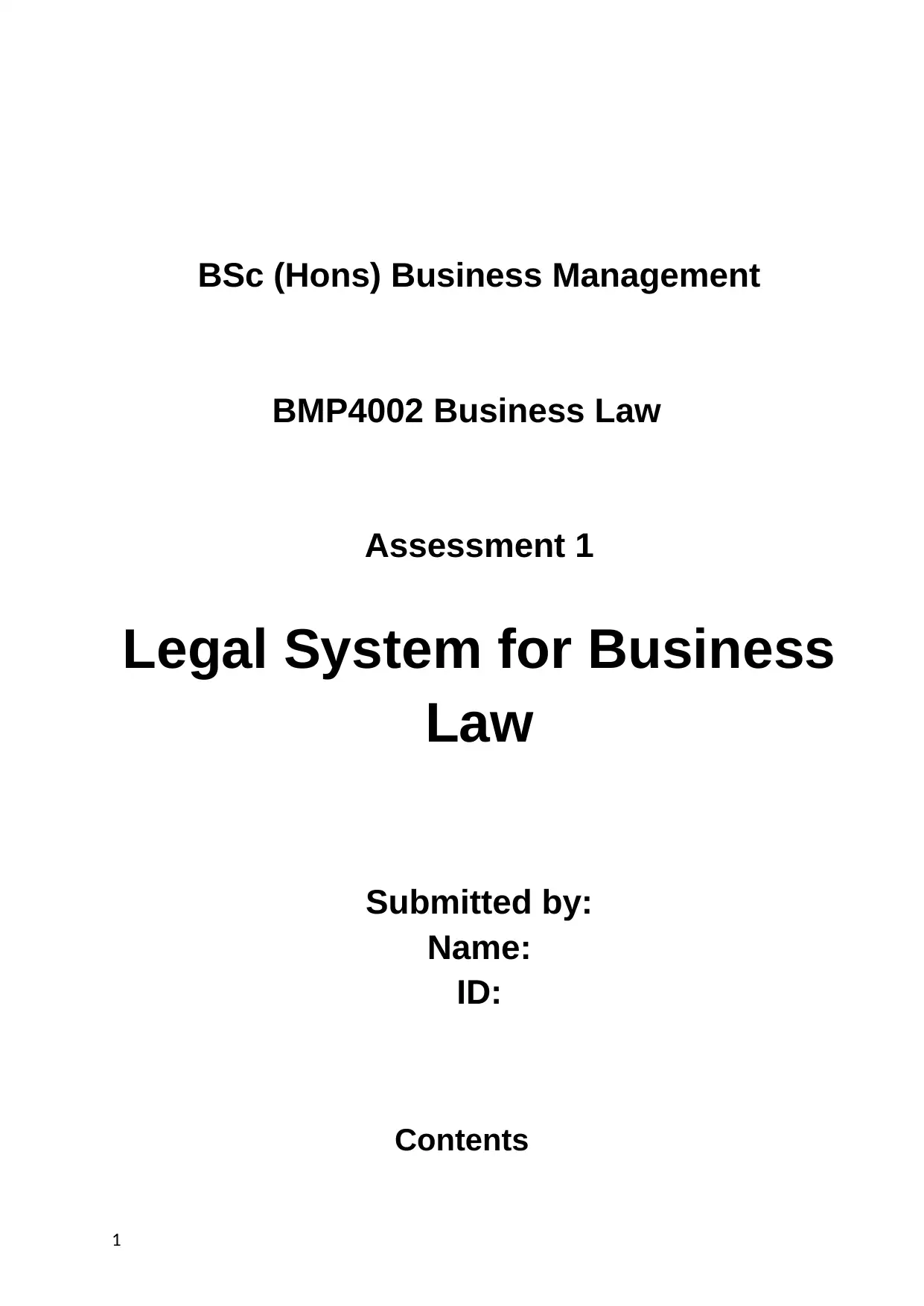
BSc (Hons) Business Management
BMP4002 Business Law
Assessment 1
Legal System for Business
Law
Submitted by:
Name:
ID:
Contents
1
BMP4002 Business Law
Assessment 1
Legal System for Business
Law
Submitted by:
Name:
ID:
Contents
1
Paraphrase This Document
Need a fresh take? Get an instant paraphrase of this document with our AI Paraphraser
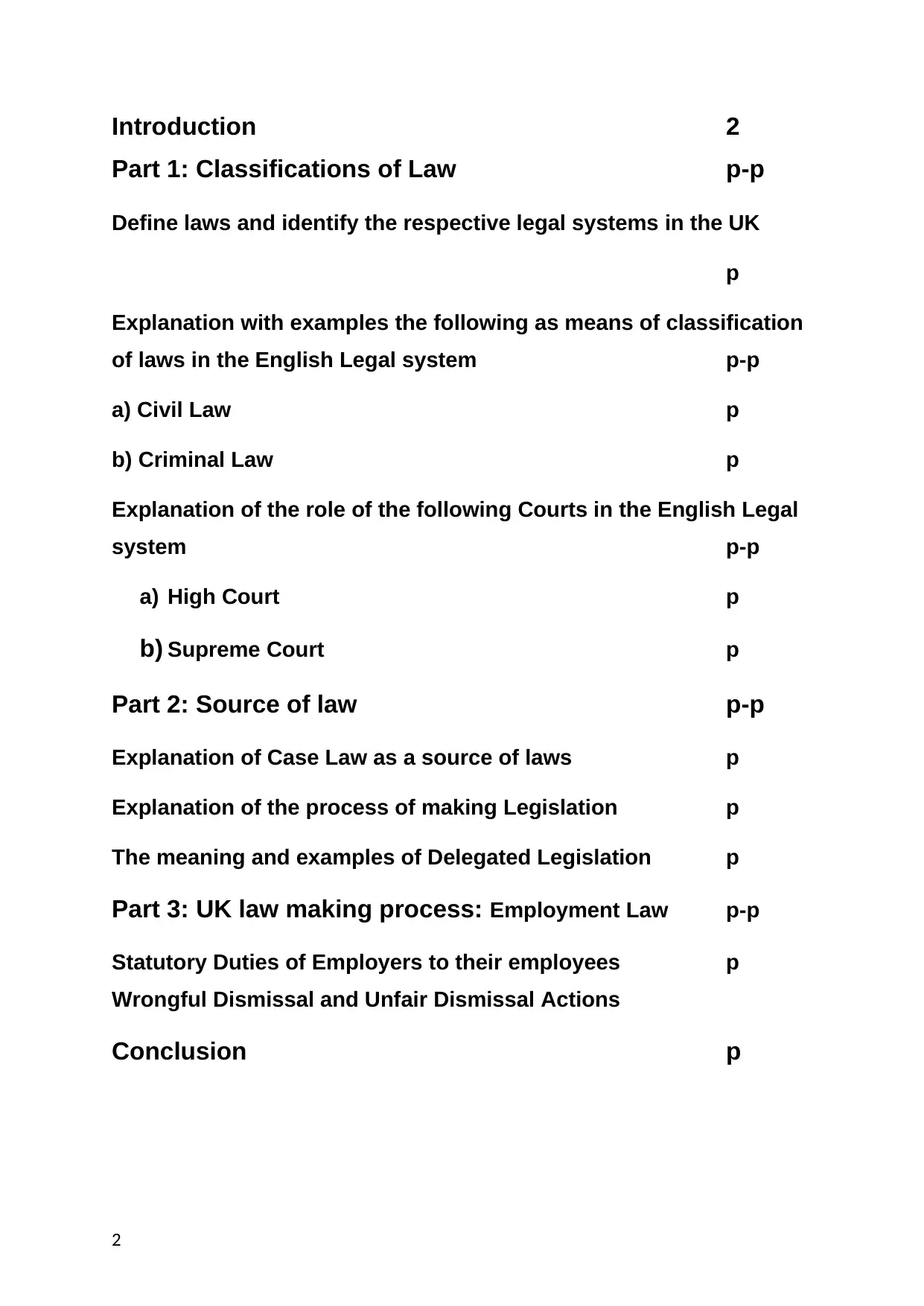
Introduction 2
Part 1: Classifications of Law p-p
Define laws and identify the respective legal systems in the UK
p
Explanation with examples the following as means of classification
of laws in the English Legal system p-p
a) Civil Law p
b) Criminal Law p
Explanation of the role of the following Courts in the English Legal
system p-p
a) High Court p
b) Supreme Court p
Part 2: Source of law p-p
Explanation of Case Law as a source of laws p
Explanation of the process of making Legislation p
The meaning and examples of Delegated Legislation p
Part 3: UK law making process: Employment Law p-p
Statutory Duties of Employers to their employees p
Wrongful Dismissal and Unfair Dismissal Actions
Conclusion p
2
Part 1: Classifications of Law p-p
Define laws and identify the respective legal systems in the UK
p
Explanation with examples the following as means of classification
of laws in the English Legal system p-p
a) Civil Law p
b) Criminal Law p
Explanation of the role of the following Courts in the English Legal
system p-p
a) High Court p
b) Supreme Court p
Part 2: Source of law p-p
Explanation of Case Law as a source of laws p
Explanation of the process of making Legislation p
The meaning and examples of Delegated Legislation p
Part 3: UK law making process: Employment Law p-p
Statutory Duties of Employers to their employees p
Wrongful Dismissal and Unfair Dismissal Actions
Conclusion p
2
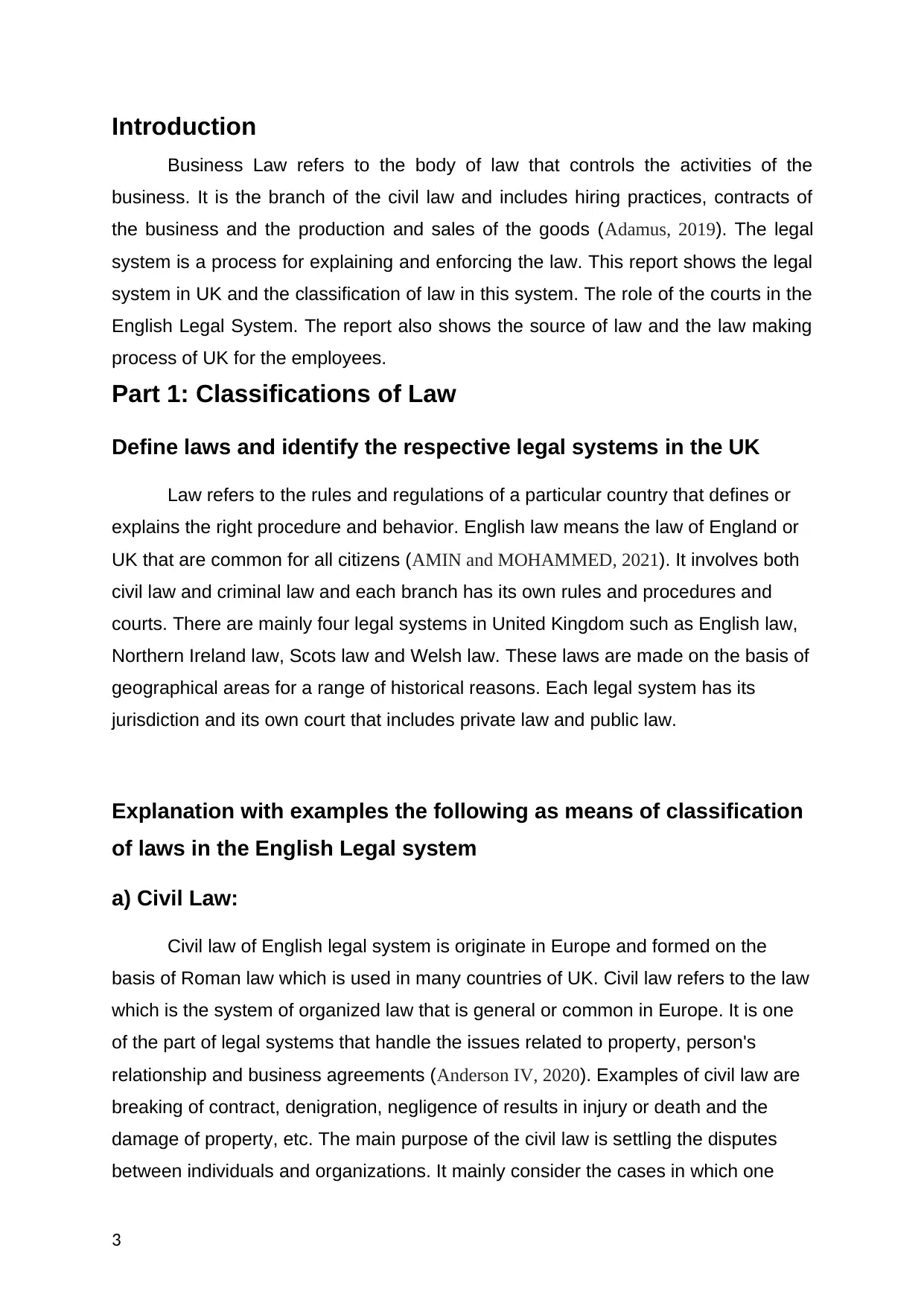
Introduction
Business Law refers to the body of law that controls the activities of the
business. It is the branch of the civil law and includes hiring practices, contracts of
the business and the production and sales of the goods (Adamus, 2019). The legal
system is a process for explaining and enforcing the law. This report shows the legal
system in UK and the classification of law in this system. The role of the courts in the
English Legal System. The report also shows the source of law and the law making
process of UK for the employees.
Part 1: Classifications of Law
Define laws and identify the respective legal systems in the UK
Law refers to the rules and regulations of a particular country that defines or
explains the right procedure and behavior. English law means the law of England or
UK that are common for all citizens (AMIN and MOHAMMED, 2021). It involves both
civil law and criminal law and each branch has its own rules and procedures and
courts. There are mainly four legal systems in United Kingdom such as English law,
Northern Ireland law, Scots law and Welsh law. These laws are made on the basis of
geographical areas for a range of historical reasons. Each legal system has its
jurisdiction and its own court that includes private law and public law.
Explanation with examples the following as means of classification
of laws in the English Legal system
a) Civil Law:
Civil law of English legal system is originate in Europe and formed on the
basis of Roman law which is used in many countries of UK. Civil law refers to the law
which is the system of organized law that is general or common in Europe. It is one
of the part of legal systems that handle the issues related to property, person's
relationship and business agreements (Anderson IV, 2020). Examples of civil law are
breaking of contract, denigration, negligence of results in injury or death and the
damage of property, etc. The main purpose of the civil law is settling the disputes
between individuals and organizations. It mainly consider the cases in which one
3
Business Law refers to the body of law that controls the activities of the
business. It is the branch of the civil law and includes hiring practices, contracts of
the business and the production and sales of the goods (Adamus, 2019). The legal
system is a process for explaining and enforcing the law. This report shows the legal
system in UK and the classification of law in this system. The role of the courts in the
English Legal System. The report also shows the source of law and the law making
process of UK for the employees.
Part 1: Classifications of Law
Define laws and identify the respective legal systems in the UK
Law refers to the rules and regulations of a particular country that defines or
explains the right procedure and behavior. English law means the law of England or
UK that are common for all citizens (AMIN and MOHAMMED, 2021). It involves both
civil law and criminal law and each branch has its own rules and procedures and
courts. There are mainly four legal systems in United Kingdom such as English law,
Northern Ireland law, Scots law and Welsh law. These laws are made on the basis of
geographical areas for a range of historical reasons. Each legal system has its
jurisdiction and its own court that includes private law and public law.
Explanation with examples the following as means of classification
of laws in the English Legal system
a) Civil Law:
Civil law of English legal system is originate in Europe and formed on the
basis of Roman law which is used in many countries of UK. Civil law refers to the law
which is the system of organized law that is general or common in Europe. It is one
of the part of legal systems that handle the issues related to property, person's
relationship and business agreements (Anderson IV, 2020). Examples of civil law are
breaking of contract, denigration, negligence of results in injury or death and the
damage of property, etc. The main purpose of the civil law is settling the disputes
between individuals and organizations. It mainly consider the cases in which one
3
⊘ This is a preview!⊘
Do you want full access?
Subscribe today to unlock all pages.

Trusted by 1+ million students worldwide
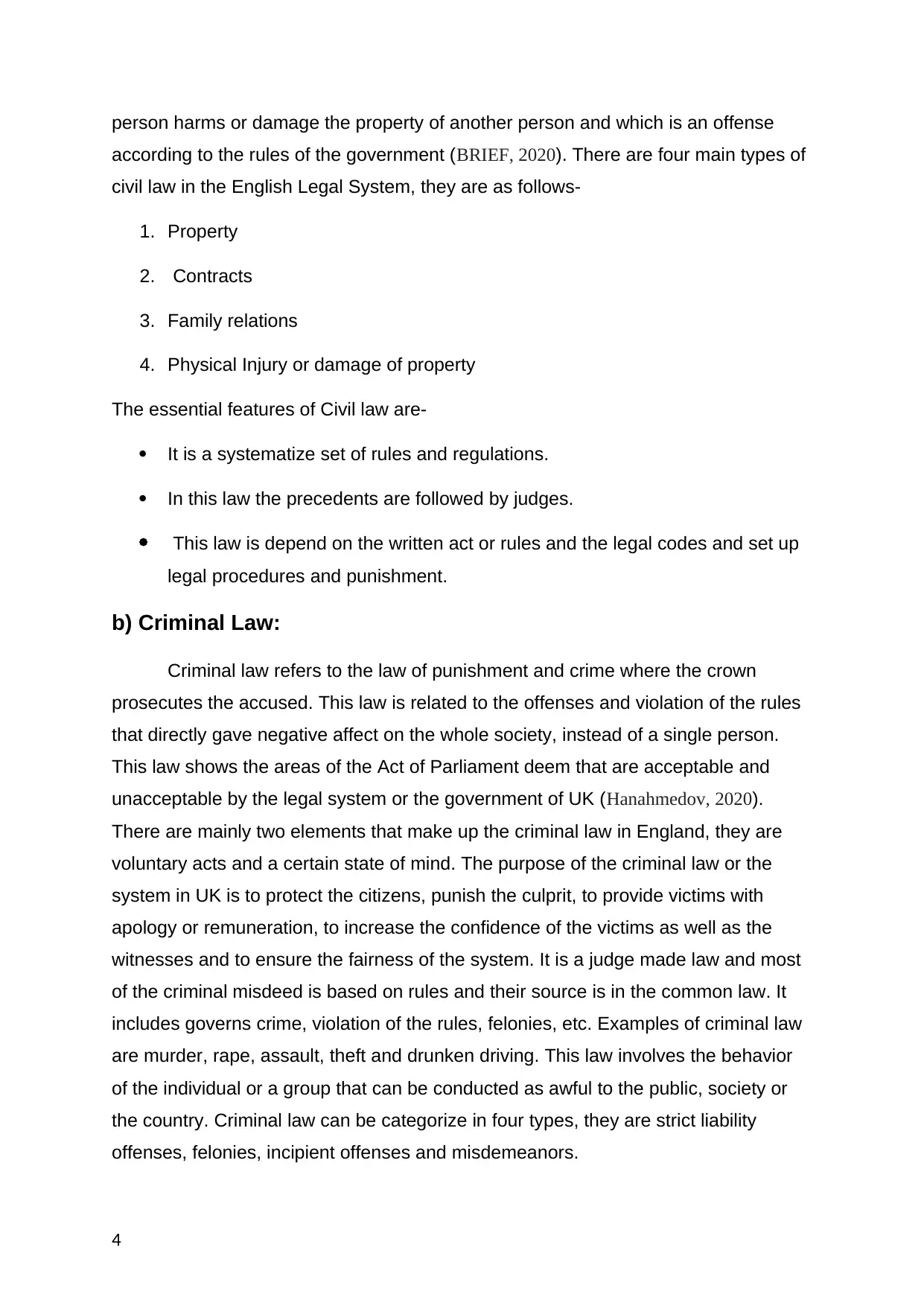
person harms or damage the property of another person and which is an offense
according to the rules of the government (BRIEF, 2020). There are four main types of
civil law in the English Legal System, they are as follows-
1. Property
2. Contracts
3. Family relations
4. Physical Injury or damage of property
The essential features of Civil law are-
It is a systematize set of rules and regulations.
In this law the precedents are followed by judges.
This law is depend on the written act or rules and the legal codes and set up
legal procedures and punishment.
b) Criminal Law:
Criminal law refers to the law of punishment and crime where the crown
prosecutes the accused. This law is related to the offenses and violation of the rules
that directly gave negative affect on the whole society, instead of a single person.
This law shows the areas of the Act of Parliament deem that are acceptable and
unacceptable by the legal system or the government of UK (Hanahmedov, 2020).
There are mainly two elements that make up the criminal law in England, they are
voluntary acts and a certain state of mind. The purpose of the criminal law or the
system in UK is to protect the citizens, punish the culprit, to provide victims with
apology or remuneration, to increase the confidence of the victims as well as the
witnesses and to ensure the fairness of the system. It is a judge made law and most
of the criminal misdeed is based on rules and their source is in the common law. It
includes governs crime, violation of the rules, felonies, etc. Examples of criminal law
are murder, rape, assault, theft and drunken driving. This law involves the behavior
of the individual or a group that can be conducted as awful to the public, society or
the country. Criminal law can be categorize in four types, they are strict liability
offenses, felonies, incipient offenses and misdemeanors.
4
according to the rules of the government (BRIEF, 2020). There are four main types of
civil law in the English Legal System, they are as follows-
1. Property
2. Contracts
3. Family relations
4. Physical Injury or damage of property
The essential features of Civil law are-
It is a systematize set of rules and regulations.
In this law the precedents are followed by judges.
This law is depend on the written act or rules and the legal codes and set up
legal procedures and punishment.
b) Criminal Law:
Criminal law refers to the law of punishment and crime where the crown
prosecutes the accused. This law is related to the offenses and violation of the rules
that directly gave negative affect on the whole society, instead of a single person.
This law shows the areas of the Act of Parliament deem that are acceptable and
unacceptable by the legal system or the government of UK (Hanahmedov, 2020).
There are mainly two elements that make up the criminal law in England, they are
voluntary acts and a certain state of mind. The purpose of the criminal law or the
system in UK is to protect the citizens, punish the culprit, to provide victims with
apology or remuneration, to increase the confidence of the victims as well as the
witnesses and to ensure the fairness of the system. It is a judge made law and most
of the criminal misdeed is based on rules and their source is in the common law. It
includes governs crime, violation of the rules, felonies, etc. Examples of criminal law
are murder, rape, assault, theft and drunken driving. This law involves the behavior
of the individual or a group that can be conducted as awful to the public, society or
the country. Criminal law can be categorize in four types, they are strict liability
offenses, felonies, incipient offenses and misdemeanors.
4
Paraphrase This Document
Need a fresh take? Get an instant paraphrase of this document with our AI Paraphraser
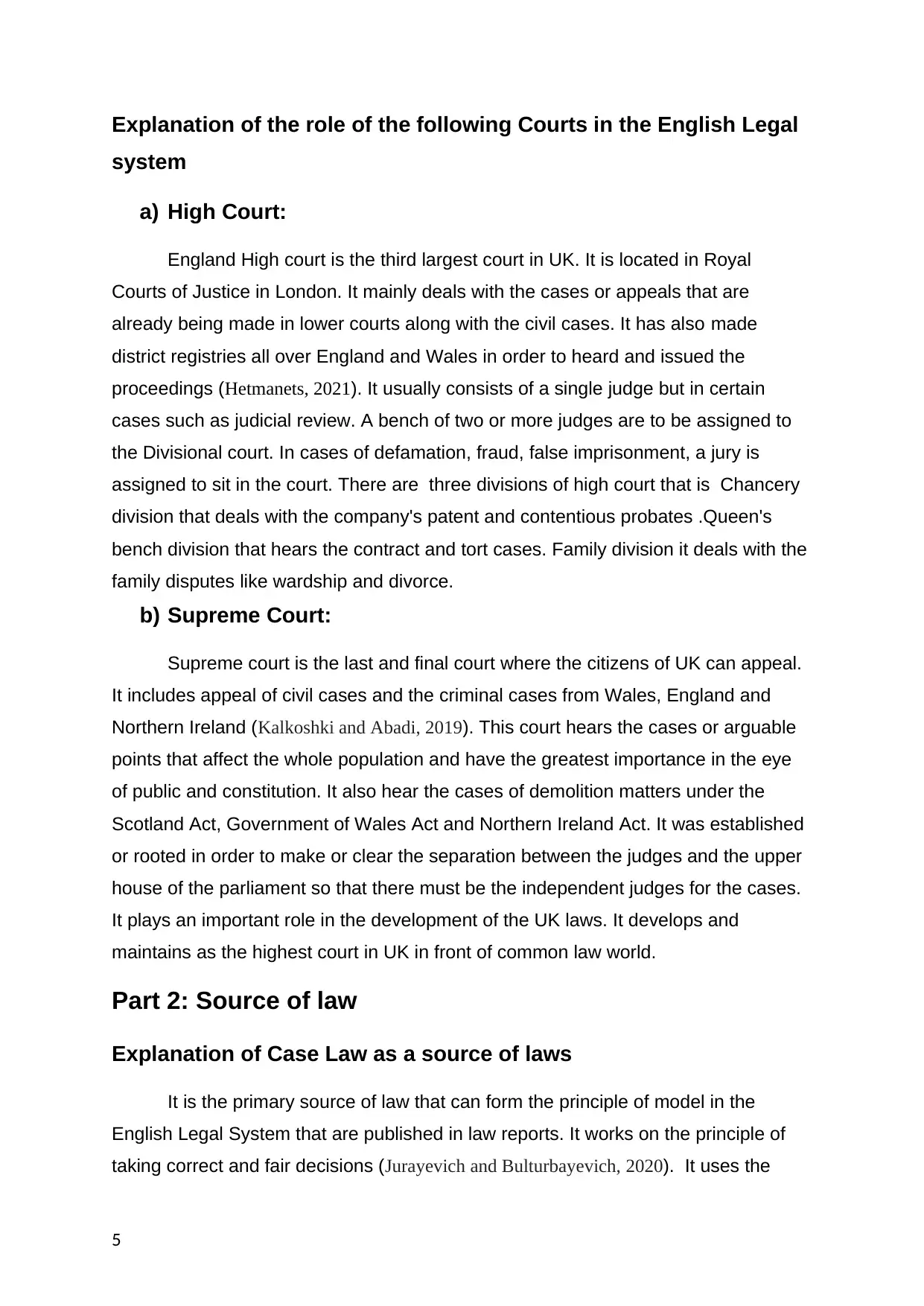
Explanation of the role of the following Courts in the English Legal
system
a) High Court:
England High court is the third largest court in UK. It is located in Royal
Courts of Justice in London. It mainly deals with the cases or appeals that are
already being made in lower courts along with the civil cases. It has also made
district registries all over England and Wales in order to heard and issued the
proceedings (Hetmanets, 2021). It usually consists of a single judge but in certain
cases such as judicial review. A bench of two or more judges are to be assigned to
the Divisional court. In cases of defamation, fraud, false imprisonment, a jury is
assigned to sit in the court. There are three divisions of high court that is Chancery
division that deals with the company's patent and contentious probates .Queen's
bench division that hears the contract and tort cases. Family division it deals with the
family disputes like wardship and divorce.
b) Supreme Court:
Supreme court is the last and final court where the citizens of UK can appeal.
It includes appeal of civil cases and the criminal cases from Wales, England and
Northern Ireland (Kalkoshki and Abadi, 2019). This court hears the cases or arguable
points that affect the whole population and have the greatest importance in the eye
of public and constitution. It also hear the cases of demolition matters under the
Scotland Act, Government of Wales Act and Northern Ireland Act. It was established
or rooted in order to make or clear the separation between the judges and the upper
house of the parliament so that there must be the independent judges for the cases.
It plays an important role in the development of the UK laws. It develops and
maintains as the highest court in UK in front of common law world.
Part 2: Source of law
Explanation of Case Law as a source of laws
It is the primary source of law that can form the principle of model in the
English Legal System that are published in law reports. It works on the principle of
taking correct and fair decisions (Jurayevich and Bulturbayevich, 2020). It uses the
5
system
a) High Court:
England High court is the third largest court in UK. It is located in Royal
Courts of Justice in London. It mainly deals with the cases or appeals that are
already being made in lower courts along with the civil cases. It has also made
district registries all over England and Wales in order to heard and issued the
proceedings (Hetmanets, 2021). It usually consists of a single judge but in certain
cases such as judicial review. A bench of two or more judges are to be assigned to
the Divisional court. In cases of defamation, fraud, false imprisonment, a jury is
assigned to sit in the court. There are three divisions of high court that is Chancery
division that deals with the company's patent and contentious probates .Queen's
bench division that hears the contract and tort cases. Family division it deals with the
family disputes like wardship and divorce.
b) Supreme Court:
Supreme court is the last and final court where the citizens of UK can appeal.
It includes appeal of civil cases and the criminal cases from Wales, England and
Northern Ireland (Kalkoshki and Abadi, 2019). This court hears the cases or arguable
points that affect the whole population and have the greatest importance in the eye
of public and constitution. It also hear the cases of demolition matters under the
Scotland Act, Government of Wales Act and Northern Ireland Act. It was established
or rooted in order to make or clear the separation between the judges and the upper
house of the parliament so that there must be the independent judges for the cases.
It plays an important role in the development of the UK laws. It develops and
maintains as the highest court in UK in front of common law world.
Part 2: Source of law
Explanation of Case Law as a source of laws
It is the primary source of law that can form the principle of model in the
English Legal System that are published in law reports. It works on the principle of
taking correct and fair decisions (Jurayevich and Bulturbayevich, 2020). It uses the
5
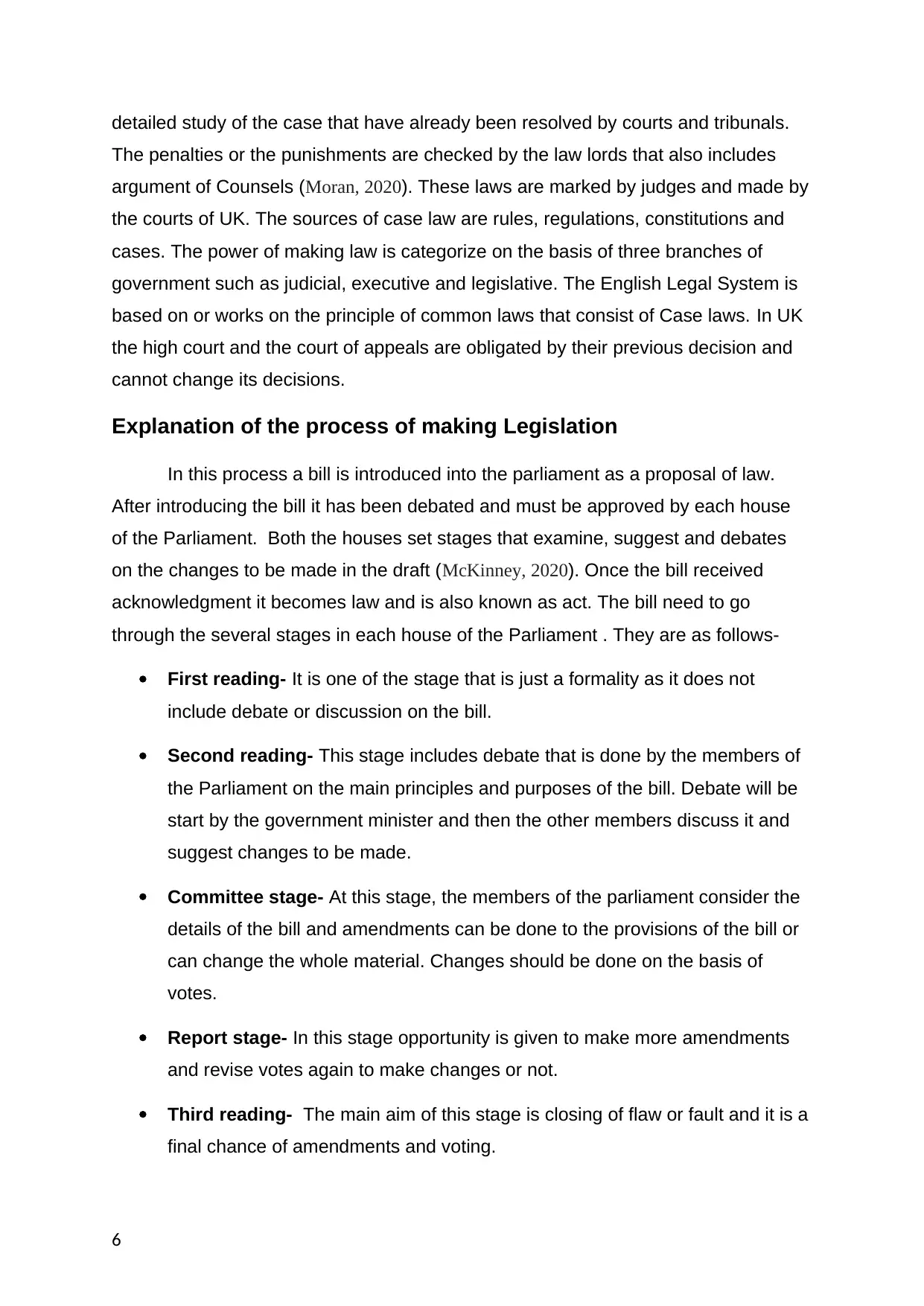
detailed study of the case that have already been resolved by courts and tribunals.
The penalties or the punishments are checked by the law lords that also includes
argument of Counsels (Moran, 2020). These laws are marked by judges and made by
the courts of UK. The sources of case law are rules, regulations, constitutions and
cases. The power of making law is categorize on the basis of three branches of
government such as judicial, executive and legislative. The English Legal System is
based on or works on the principle of common laws that consist of Case laws. In UK
the high court and the court of appeals are obligated by their previous decision and
cannot change its decisions.
Explanation of the process of making Legislation
In this process a bill is introduced into the parliament as a proposal of law.
After introducing the bill it has been debated and must be approved by each house
of the Parliament. Both the houses set stages that examine, suggest and debates
on the changes to be made in the draft (McKinney, 2020). Once the bill received
acknowledgment it becomes law and is also known as act. The bill need to go
through the several stages in each house of the Parliament . They are as follows-
First reading- It is one of the stage that is just a formality as it does not
include debate or discussion on the bill.
Second reading- This stage includes debate that is done by the members of
the Parliament on the main principles and purposes of the bill. Debate will be
start by the government minister and then the other members discuss it and
suggest changes to be made.
Committee stage- At this stage, the members of the parliament consider the
details of the bill and amendments can be done to the provisions of the bill or
can change the whole material. Changes should be done on the basis of
votes.
Report stage- In this stage opportunity is given to make more amendments
and revise votes again to make changes or not.
Third reading- The main aim of this stage is closing of flaw or fault and it is a
final chance of amendments and voting.
6
The penalties or the punishments are checked by the law lords that also includes
argument of Counsels (Moran, 2020). These laws are marked by judges and made by
the courts of UK. The sources of case law are rules, regulations, constitutions and
cases. The power of making law is categorize on the basis of three branches of
government such as judicial, executive and legislative. The English Legal System is
based on or works on the principle of common laws that consist of Case laws. In UK
the high court and the court of appeals are obligated by their previous decision and
cannot change its decisions.
Explanation of the process of making Legislation
In this process a bill is introduced into the parliament as a proposal of law.
After introducing the bill it has been debated and must be approved by each house
of the Parliament. Both the houses set stages that examine, suggest and debates
on the changes to be made in the draft (McKinney, 2020). Once the bill received
acknowledgment it becomes law and is also known as act. The bill need to go
through the several stages in each house of the Parliament . They are as follows-
First reading- It is one of the stage that is just a formality as it does not
include debate or discussion on the bill.
Second reading- This stage includes debate that is done by the members of
the Parliament on the main principles and purposes of the bill. Debate will be
start by the government minister and then the other members discuss it and
suggest changes to be made.
Committee stage- At this stage, the members of the parliament consider the
details of the bill and amendments can be done to the provisions of the bill or
can change the whole material. Changes should be done on the basis of
votes.
Report stage- In this stage opportunity is given to make more amendments
and revise votes again to make changes or not.
Third reading- The main aim of this stage is closing of flaw or fault and it is a
final chance of amendments and voting.
6
⊘ This is a preview!⊘
Do you want full access?
Subscribe today to unlock all pages.

Trusted by 1+ million students worldwide
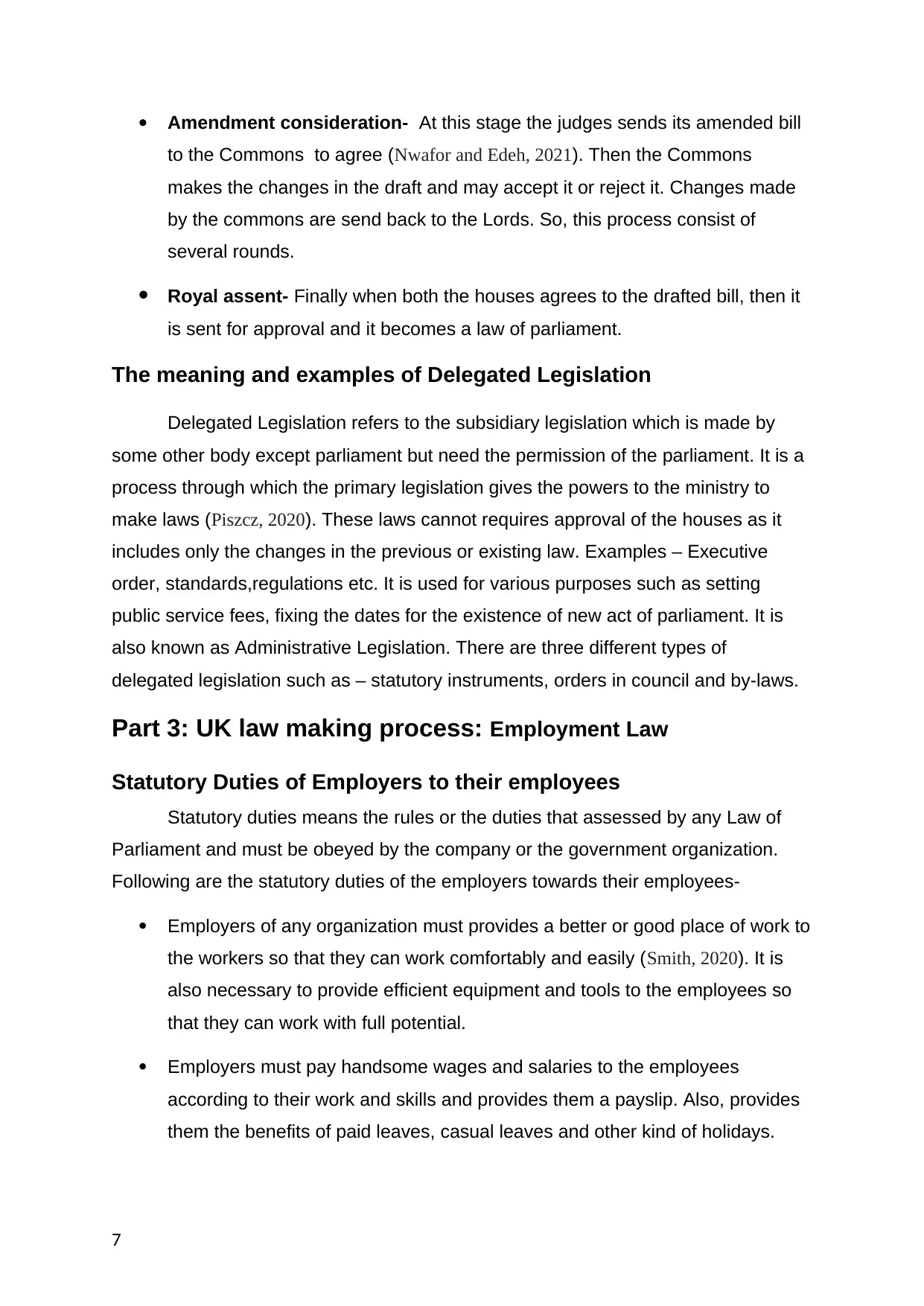
Amendment consideration- At this stage the judges sends its amended bill
to the Commons to agree (Nwafor and Edeh, 2021). Then the Commons
makes the changes in the draft and may accept it or reject it. Changes made
by the commons are send back to the Lords. So, this process consist of
several rounds.
Royal assent- Finally when both the houses agrees to the drafted bill, then it
is sent for approval and it becomes a law of parliament.
The meaning and examples of Delegated Legislation
Delegated Legislation refers to the subsidiary legislation which is made by
some other body except parliament but need the permission of the parliament. It is a
process through which the primary legislation gives the powers to the ministry to
make laws (Piszcz, 2020). These laws cannot requires approval of the houses as it
includes only the changes in the previous or existing law. Examples – Executive
order, standards,regulations etc. It is used for various purposes such as setting
public service fees, fixing the dates for the existence of new act of parliament. It is
also known as Administrative Legislation. There are three different types of
delegated legislation such as – statutory instruments, orders in council and by-laws.
Part 3: UK law making process: Employment Law
Statutory Duties of Employers to their employees
Statutory duties means the rules or the duties that assessed by any Law of
Parliament and must be obeyed by the company or the government organization.
Following are the statutory duties of the employers towards their employees-
Employers of any organization must provides a better or good place of work to
the workers so that they can work comfortably and easily (Smith, 2020). It is
also necessary to provide efficient equipment and tools to the employees so
that they can work with full potential.
Employers must pay handsome wages and salaries to the employees
according to their work and skills and provides them a payslip. Also, provides
them the benefits of paid leaves, casual leaves and other kind of holidays.
7
to the Commons to agree (Nwafor and Edeh, 2021). Then the Commons
makes the changes in the draft and may accept it or reject it. Changes made
by the commons are send back to the Lords. So, this process consist of
several rounds.
Royal assent- Finally when both the houses agrees to the drafted bill, then it
is sent for approval and it becomes a law of parliament.
The meaning and examples of Delegated Legislation
Delegated Legislation refers to the subsidiary legislation which is made by
some other body except parliament but need the permission of the parliament. It is a
process through which the primary legislation gives the powers to the ministry to
make laws (Piszcz, 2020). These laws cannot requires approval of the houses as it
includes only the changes in the previous or existing law. Examples – Executive
order, standards,regulations etc. It is used for various purposes such as setting
public service fees, fixing the dates for the existence of new act of parliament. It is
also known as Administrative Legislation. There are three different types of
delegated legislation such as – statutory instruments, orders in council and by-laws.
Part 3: UK law making process: Employment Law
Statutory Duties of Employers to their employees
Statutory duties means the rules or the duties that assessed by any Law of
Parliament and must be obeyed by the company or the government organization.
Following are the statutory duties of the employers towards their employees-
Employers of any organization must provides a better or good place of work to
the workers so that they can work comfortably and easily (Smith, 2020). It is
also necessary to provide efficient equipment and tools to the employees so
that they can work with full potential.
Employers must pay handsome wages and salaries to the employees
according to their work and skills and provides them a payslip. Also, provides
them the benefits of paid leaves, casual leaves and other kind of holidays.
7
Paraphrase This Document
Need a fresh take? Get an instant paraphrase of this document with our AI Paraphraser
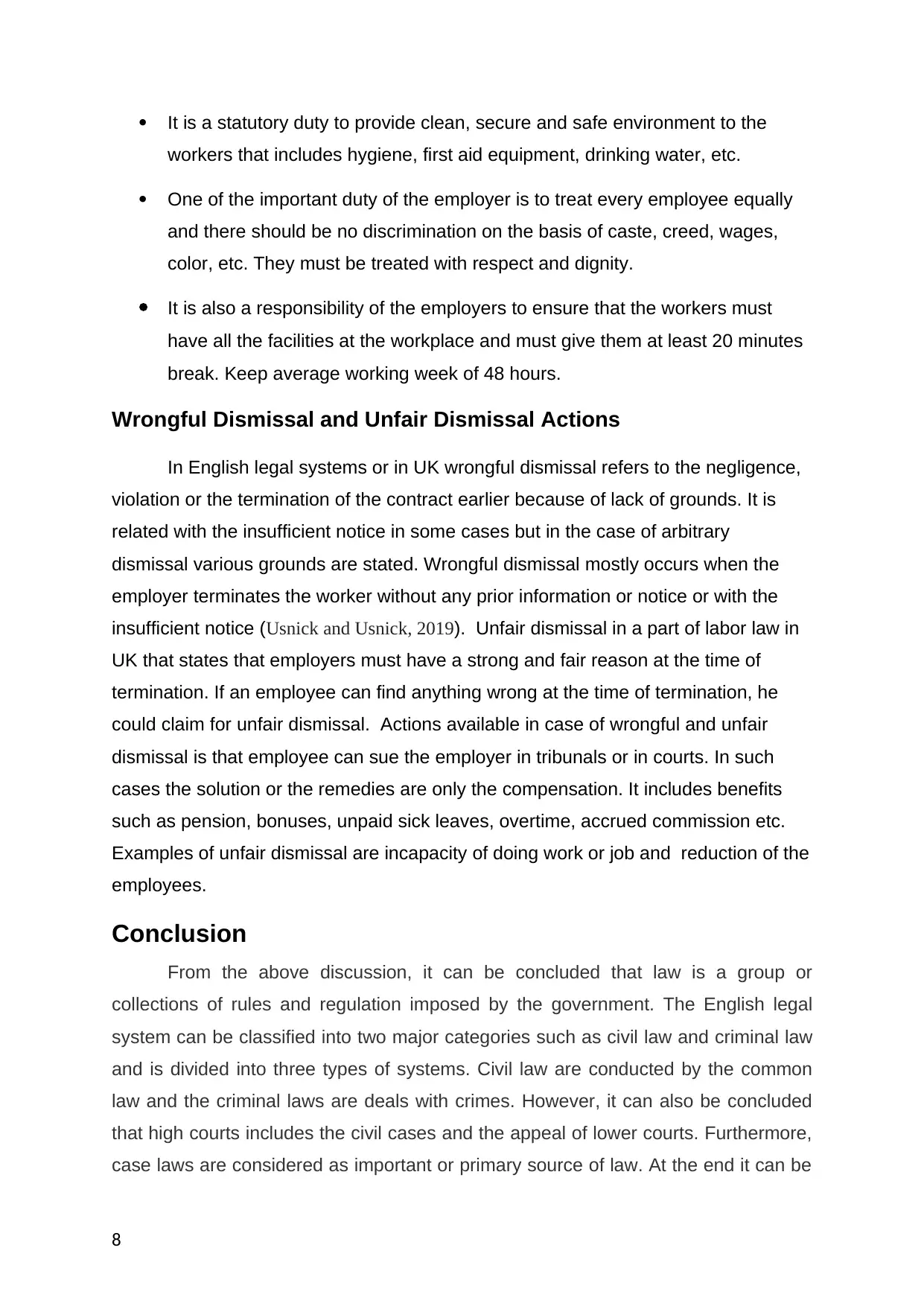
It is a statutory duty to provide clean, secure and safe environment to the
workers that includes hygiene, first aid equipment, drinking water, etc.
One of the important duty of the employer is to treat every employee equally
and there should be no discrimination on the basis of caste, creed, wages,
color, etc. They must be treated with respect and dignity.
It is also a responsibility of the employers to ensure that the workers must
have all the facilities at the workplace and must give them at least 20 minutes
break. Keep average working week of 48 hours.
Wrongful Dismissal and Unfair Dismissal Actions
In English legal systems or in UK wrongful dismissal refers to the negligence,
violation or the termination of the contract earlier because of lack of grounds. It is
related with the insufficient notice in some cases but in the case of arbitrary
dismissal various grounds are stated. Wrongful dismissal mostly occurs when the
employer terminates the worker without any prior information or notice or with the
insufficient notice (Usnick and Usnick, 2019). Unfair dismissal in a part of labor law in
UK that states that employers must have a strong and fair reason at the time of
termination. If an employee can find anything wrong at the time of termination, he
could claim for unfair dismissal. Actions available in case of wrongful and unfair
dismissal is that employee can sue the employer in tribunals or in courts. In such
cases the solution or the remedies are only the compensation. It includes benefits
such as pension, bonuses, unpaid sick leaves, overtime, accrued commission etc.
Examples of unfair dismissal are incapacity of doing work or job and reduction of the
employees.
Conclusion
From the above discussion, it can be concluded that law is a group or
collections of rules and regulation imposed by the government. The English legal
system can be classified into two major categories such as civil law and criminal law
and is divided into three types of systems. Civil law are conducted by the common
law and the criminal laws are deals with crimes. However, it can also be concluded
that high courts includes the civil cases and the appeal of lower courts. Furthermore,
case laws are considered as important or primary source of law. At the end it can be
8
workers that includes hygiene, first aid equipment, drinking water, etc.
One of the important duty of the employer is to treat every employee equally
and there should be no discrimination on the basis of caste, creed, wages,
color, etc. They must be treated with respect and dignity.
It is also a responsibility of the employers to ensure that the workers must
have all the facilities at the workplace and must give them at least 20 minutes
break. Keep average working week of 48 hours.
Wrongful Dismissal and Unfair Dismissal Actions
In English legal systems or in UK wrongful dismissal refers to the negligence,
violation or the termination of the contract earlier because of lack of grounds. It is
related with the insufficient notice in some cases but in the case of arbitrary
dismissal various grounds are stated. Wrongful dismissal mostly occurs when the
employer terminates the worker without any prior information or notice or with the
insufficient notice (Usnick and Usnick, 2019). Unfair dismissal in a part of labor law in
UK that states that employers must have a strong and fair reason at the time of
termination. If an employee can find anything wrong at the time of termination, he
could claim for unfair dismissal. Actions available in case of wrongful and unfair
dismissal is that employee can sue the employer in tribunals or in courts. In such
cases the solution or the remedies are only the compensation. It includes benefits
such as pension, bonuses, unpaid sick leaves, overtime, accrued commission etc.
Examples of unfair dismissal are incapacity of doing work or job and reduction of the
employees.
Conclusion
From the above discussion, it can be concluded that law is a group or
collections of rules and regulation imposed by the government. The English legal
system can be classified into two major categories such as civil law and criminal law
and is divided into three types of systems. Civil law are conducted by the common
law and the criminal laws are deals with crimes. However, it can also be concluded
that high courts includes the civil cases and the appeal of lower courts. Furthermore,
case laws are considered as important or primary source of law. At the end it can be
8
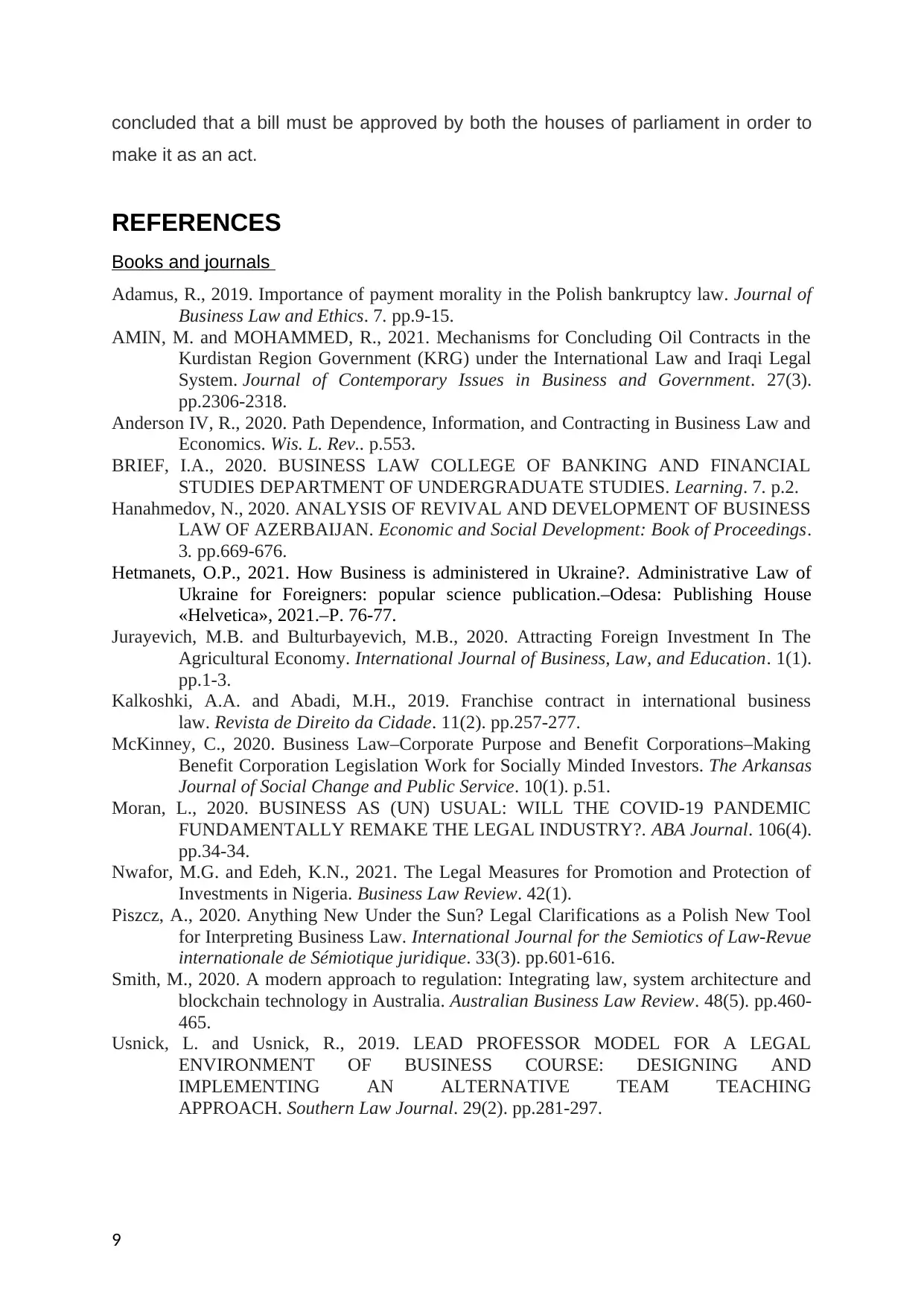
concluded that a bill must be approved by both the houses of parliament in order to
make it as an act.
REFERENCES
Books and journals
Adamus, R., 2019. Importance of payment morality in the Polish bankruptcy law. Journal of
Business Law and Ethics. 7. pp.9-15.
AMIN, M. and MOHAMMED, R., 2021. Mechanisms for Concluding Oil Contracts in the
Kurdistan Region Government (KRG) under the International Law and Iraqi Legal
System. Journal of Contemporary Issues in Business and Government. 27(3).
pp.2306-2318.
Anderson IV, R., 2020. Path Dependence, Information, and Contracting in Business Law and
Economics. Wis. L. Rev.. p.553.
BRIEF, I.A., 2020. BUSINESS LAW COLLEGE OF BANKING AND FINANCIAL
STUDIES DEPARTMENT OF UNDERGRADUATE STUDIES. Learning. 7. p.2.
Hanahmedov, N., 2020. ANALYSIS OF REVIVAL AND DEVELOPMENT OF BUSINESS
LAW OF AZERBAIJAN. Economic and Social Development: Book of Proceedings.
3. pp.669-676.
Hetmanets, O.P., 2021. How Business is administered in Ukraine?. Administrative Law of
Ukraine for Foreigners: popular science publication.–Odesa: Publishing House
«Helvetica», 2021.–P. 76-77.
Jurayevich, M.B. and Bulturbayevich, M.B., 2020. Attracting Foreign Investment In The
Agricultural Economy. International Journal of Business, Law, and Education. 1(1).
pp.1-3.
Kalkoshki, A.A. and Abadi, M.H., 2019. Franchise contract in international business
law. Revista de Direito da Cidade. 11(2). pp.257-277.
McKinney, C., 2020. Business Law–Corporate Purpose and Benefit Corporations–Making
Benefit Corporation Legislation Work for Socially Minded Investors. The Arkansas
Journal of Social Change and Public Service. 10(1). p.51.
Moran, L., 2020. BUSINESS AS (UN) USUAL: WILL THE COVID-19 PANDEMIC
FUNDAMENTALLY REMAKE THE LEGAL INDUSTRY?. ABA Journal. 106(4).
pp.34-34.
Nwafor, M.G. and Edeh, K.N., 2021. The Legal Measures for Promotion and Protection of
Investments in Nigeria. Business Law Review. 42(1).
Piszcz, A., 2020. Anything New Under the Sun? Legal Clarifications as a Polish New Tool
for Interpreting Business Law. International Journal for the Semiotics of Law-Revue
internationale de Sémiotique juridique. 33(3). pp.601-616.
Smith, M., 2020. A modern approach to regulation: Integrating law, system architecture and
blockchain technology in Australia. Australian Business Law Review. 48(5). pp.460-
465.
Usnick, L. and Usnick, R., 2019. LEAD PROFESSOR MODEL FOR A LEGAL
ENVIRONMENT OF BUSINESS COURSE: DESIGNING AND
IMPLEMENTING AN ALTERNATIVE TEAM TEACHING
APPROACH. Southern Law Journal. 29(2). pp.281-297.
9
make it as an act.
REFERENCES
Books and journals
Adamus, R., 2019. Importance of payment morality in the Polish bankruptcy law. Journal of
Business Law and Ethics. 7. pp.9-15.
AMIN, M. and MOHAMMED, R., 2021. Mechanisms for Concluding Oil Contracts in the
Kurdistan Region Government (KRG) under the International Law and Iraqi Legal
System. Journal of Contemporary Issues in Business and Government. 27(3).
pp.2306-2318.
Anderson IV, R., 2020. Path Dependence, Information, and Contracting in Business Law and
Economics. Wis. L. Rev.. p.553.
BRIEF, I.A., 2020. BUSINESS LAW COLLEGE OF BANKING AND FINANCIAL
STUDIES DEPARTMENT OF UNDERGRADUATE STUDIES. Learning. 7. p.2.
Hanahmedov, N., 2020. ANALYSIS OF REVIVAL AND DEVELOPMENT OF BUSINESS
LAW OF AZERBAIJAN. Economic and Social Development: Book of Proceedings.
3. pp.669-676.
Hetmanets, O.P., 2021. How Business is administered in Ukraine?. Administrative Law of
Ukraine for Foreigners: popular science publication.–Odesa: Publishing House
«Helvetica», 2021.–P. 76-77.
Jurayevich, M.B. and Bulturbayevich, M.B., 2020. Attracting Foreign Investment In The
Agricultural Economy. International Journal of Business, Law, and Education. 1(1).
pp.1-3.
Kalkoshki, A.A. and Abadi, M.H., 2019. Franchise contract in international business
law. Revista de Direito da Cidade. 11(2). pp.257-277.
McKinney, C., 2020. Business Law–Corporate Purpose and Benefit Corporations–Making
Benefit Corporation Legislation Work for Socially Minded Investors. The Arkansas
Journal of Social Change and Public Service. 10(1). p.51.
Moran, L., 2020. BUSINESS AS (UN) USUAL: WILL THE COVID-19 PANDEMIC
FUNDAMENTALLY REMAKE THE LEGAL INDUSTRY?. ABA Journal. 106(4).
pp.34-34.
Nwafor, M.G. and Edeh, K.N., 2021. The Legal Measures for Promotion and Protection of
Investments in Nigeria. Business Law Review. 42(1).
Piszcz, A., 2020. Anything New Under the Sun? Legal Clarifications as a Polish New Tool
for Interpreting Business Law. International Journal for the Semiotics of Law-Revue
internationale de Sémiotique juridique. 33(3). pp.601-616.
Smith, M., 2020. A modern approach to regulation: Integrating law, system architecture and
blockchain technology in Australia. Australian Business Law Review. 48(5). pp.460-
465.
Usnick, L. and Usnick, R., 2019. LEAD PROFESSOR MODEL FOR A LEGAL
ENVIRONMENT OF BUSINESS COURSE: DESIGNING AND
IMPLEMENTING AN ALTERNATIVE TEAM TEACHING
APPROACH. Southern Law Journal. 29(2). pp.281-297.
9
⊘ This is a preview!⊘
Do you want full access?
Subscribe today to unlock all pages.

Trusted by 1+ million students worldwide
1 out of 9
Related Documents
Your All-in-One AI-Powered Toolkit for Academic Success.
+13062052269
info@desklib.com
Available 24*7 on WhatsApp / Email
![[object Object]](/_next/static/media/star-bottom.7253800d.svg)
Unlock your academic potential
Copyright © 2020–2026 A2Z Services. All Rights Reserved. Developed and managed by ZUCOL.




